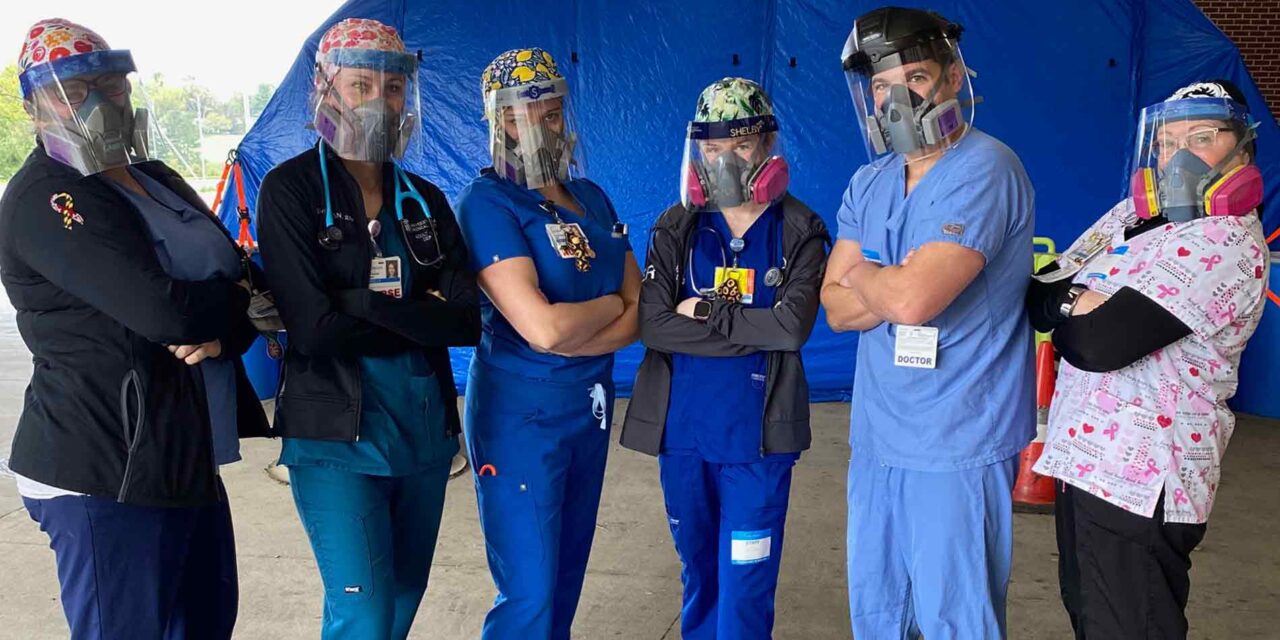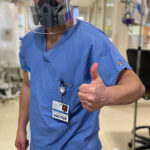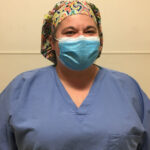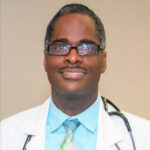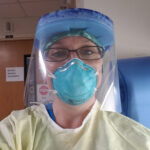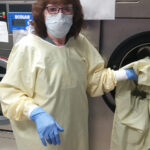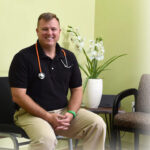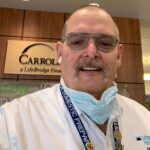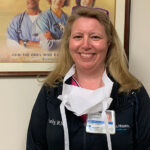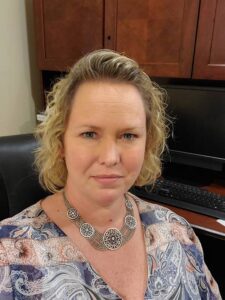by Kym Byrnes
Healthcare workers are among the people who have been on the front lines of fighting this pandemic, working feverishly to prepare for the sick, to aid the sick, and to help families say goodbye to their dying relatives. In a Psychology Today article, PTSD specialist Dr. Shaili Jain said that many healthcare workers are at risk of suffering from mental health trauma associated with fighting COVID-19. Looking at case studies from doctors who worked through the Ebola outbreak in 2014 through 2016, Jain said that during a pandemic, healthcare workers face unique stressors including “the death of colleagues (a chilling reminder of their own vulnerability), the high stakes demands that force them to ‘carry on and defer’ grieving and the processing of emotions and subsequent self-quarantine mandates which left them isolated from their traditional support systems.”
Like other healthcare workers around the country, Carroll’s healthcare professionals are experiencing a range of emotions including fear, pride, frustration and exhaustion. We checked in with a few in April — when cases were still on the rise but Maryland health systems were not generally overwhelmed.
- Mark Goldstein, MD
- Beth Carr, RN
- James Clement, MD
- Megan Andrews, RN
- Betty Knatz
- Casey Davis, PA
- Tom Jeffers
- Shelly Metts, RN
“In the very early days of the pandemic when the world was closing in around us, I felt fear and there was a sense of being powerless against an invisible enemy about which we knew very little. Things have now evolved in a positive sense. While there is always some level of apprehension about this disease, I feel like we’ve created precautions and rebuilt our practices/procedures to the point where we’ve taken back control. Like everyone else, I long for a return to normality. But in this new normal, I am proud — of my colleagues at Carroll and in the healthcare community at large — for adapting and persevering.”
Mark Goldstein, MD, left, emergency physician, director of clinical operations for ED, Carroll Hospital
“I am fearful, not for myself, but for my family that I could potentially bring this deadly disease back to. I feel anxious, as there still so much uncertainty and unknown about what we are facing. I am frustrated with the lack of timely, accurate and available testing. I am discouraged at the lack of respect for social distancing some people have. Lastly, I am thankful that Carroll Hospital has done a great job keeping us in adequate PPE [personal protective equipment], but I am concerned for my friends, family and peers across the nation for their PPE availability.”
Beth Carr, RN at the cardiovascular lab, PRN in the emergency department, Carroll Hospital
“This is an unprecedented time in all of our lives. We are all facing challenges that we never thought possible. We have chosen a profession which can weigh heavily on our hearts. I have been working with genuinely dedicated people and the physicians have formed a symbiotic relationship with the nursing staff, case management, respiratory therapists, becoming one unit, to take care of our patients. Throughout my career, I have never seen such a level of commitment.”
James Clement MD, hospitalist program director, Carroll Hospital
“There are so many emotions to be felt during this time. The emotion I try to focus on the most is my determination. I am determined to be strong and be mentally prepared and focused on each shift. This determination allows me to provide adequate care for my patients, and be there for my co-workers and community as well. I have so much pride for what our hospital does every day. It’s a trying time on all of us, and we will thrive; however, along with the determination, there is also some anxiousness and fear.”
Megan Andrews, RN supplemental staff, Carroll Hospital
“The pandemic is scary and there are a lot of uncertainties, not knowing who may be carrying the virus, who may have it without symptoms, and will I possibly carry it home to my family? I sympathize with anyone who may be ill with the virus or have passed from complications, along with their family members. I praise the medical staff, including the support staff, because we are in this together. I have worked here for 16 years, report to work every day, follow the protocols in place, support the staff and patients in any way possible, and have faith that we will get through this.”
Betty Knatz, team leader, Carroll Hospital Environmental Services Department
“In the midst of the chaos, confusion, and conflict that has come out of COVID, we have an opportunity to encourage our community. There is a lot of fear due to the unknown … the uncertainty … and that can be overwhelming and paralyzing. Just prior to COVID, our church [LifePoint] did a group exercise and memorized a Bible verse together [2 Timothy 1:7]: ‘For God has not given us a spirit of fear, but of power and of love and of a sound mind.’ I share this with my patients who are open to this and may be having those feelings of tremendous fear.”
Casey Davis, physician assistant, Dr. Wilbur Kuo & Associates (Eldersburg) and Creator of the KnowMe ID (winner of the 2019 Carroll Biz Challenge)
“One emotion I can identify is pride in the outstanding work all of our caregivers are providing and the teamwork that is being displayed across all of the entities. I am extremely satisfied at the flexibility of everyone involved as this situation is ever changing. I grieve for those members of our communities that have lost family members and friends. The members of our communities that are denying the existence of the pandemic has me nervous as they could lead to another surge of patients. I am excited to be in this position to be sharing my knowledge and experience at the same time I am continually learning more and more as the situation progresses.”
Tom Jeffers, corporate director of emergency management for Lifebridge Health, previously director of emergency management at Carroll Hospital
“I feel blessed and proud to be a part of not just the team at Carroll Hospital Center, but also part of such a generous community. Everyone has stepped up and been very gracious. The other side of me certainly has fear and anxiety. Fear of this virus continuing to have its awful impact on lives, along with the fear and anxiety of taking this virus home to my family inadvertently. Our lives are changing every day. We [healthcare workers] are doing things we never thought we would do and making decisions we never thought we would have to make. The healthcare system is doing everything it can to help flatten the curve but we are also needing to rely on the public to do their part and stay home if not going out for essential needs.”
Shelly Metts, RN, shift coordinator/staff nurse, Carroll Hospital
“One of the strongest emotions I’ve felt as a healthcare professional is frustration. People are very vocal with their opinions about everything and when this all started and my building (Sun Valley Assisted Living) had positive cases, people were really placing blame on the healthcare workers and saying we should be ashamed of ourselves for letting it happen, and that was really hurtful. My staff and I know that we did the best we could. Our residents are compromised and we did our best to prevent spread and keep people safe.”
Patricia Outland executive director of Arden Courts in Pikesville, formerly executive director of Sun Valley Assisted Living in Sykesville (Outland was infected with COVID-19 through contact at work — her story follows).
“Oh no, this is how it’s going to start…”
Patricia Outland lives in Sykesville and up until a few months ago, was executive director of Sun Valley Assisted Living in Sykesville. She was unknowingly exposed to the coronavirus at work and now knows that by the time she felt symptoms and was able to get tested she had likely exposed others to the virus. Outland has seen the virus, and the response to the virus, as both a healthcare worker and a patient.
In early February, the United States was keenly aware that the rest of the world was being hit hard by coronavirus, but was not yet feverishly preparing for it to arrive here. The World Health Organization had just announced a global health emergency and France had just announced the first COVID-19 related death in Europe. And Patricia Outland wasn’t feeling well.
As a healthcare professional dealing with an at-risk population, she was taking precautions — monitoring herself multiple times a day for fever and cough (she had neither). She said her symptoms worsened — she was feeling ill and tired, and had aches and pains, but she assumed she was getting the flu, or having an allergy flare-up. Over the next few days, a traveling nurse who had been in her facility, and with whom Outland had met, tested positive for COVID-19. And then one of the nurses in Outland’s building tested positive.
“I thought, ‘Oh no, this is how it’s going to start.’ I felt some feelings of panic.”
At this point Outland was very suspicious that she was COVID-19 positive and was horrified that in the time since she had been exposed to the traveling nurse, she had been in contact with patients, colleagues and a host of other people, including her husband and two children.
Outland said that because it was still so early, it was still unclear exactly what symptoms they should be looking for. The nurse who tested positive had typical symptoms they had heard about — cough, fever spikes. Outland said she never had a fever but that she and another nurse in her building lost their sense of taste and smell (now documented symptoms of COVID-19). It took four days to get test results and by the time she found out she was positive, she said she was past the worst of the symptoms.
“When I found out I tested positive, I was scared because I have two young kids, I work with patients, my husband is an essential employee. I had a wave of panic thinking. ‘I’m the one spreading it because I didn’t even know I had it.’ I was probably a week into symptoms before I recognized it was COVID-related, and I am a healthcare professional.”
Outland said her husband got very sick with respiratory problems, even requiring a call to 911 at one point to help him when he was unable to breathe. Her whole family had severe headaches. She said for her children, the primary symptom was headache for a couple weeks. She said at this point, residents in her assisted-care facility were dying, families couldn’t come visit and she worried about her own aging parents. Her world was in many ways upside down.
“That time was like an out-of-body experience because that same week one of our friends died within 72 hours of having symptoms. COVID-19 became extremely real for us.”
No one in Outland’s family was hospitalized while fighting coronavirus but Outland said the headaches were severe enough that she would have sought medical care if she didn’t know it was due to COVID-19. She said symptoms included excruciating facial pressure, fatigue and shortness of breath. As of mid-May (three months since she was exposed), she said she was still experiencing the weird sense of limited taste and smell, and she was still feeling some fatigue and shortness of breath.
Outland was already in the process of leaving Sun Valley Assisted Living to be the executive director at Arden Courts in Pikesville, where she works now, when COVID-19 hit. She said it is surreal to see how different assisted living facilities are now — the dressing station in her current facility looks like a biohazard scene out of a movie, with all the gear and dressing and face shields and protective equipment. She said at her last job and her current job, healthcare workers quit on the spot and walked out of the building because they were scared. She said people can’t imagine how much chaos there was in healthcare environments. But in mid-May, she said, things had started to calm down and seemed more in control.
“My best advice is to use accurate and reliable resources to get information instead of just relying on the media. There is so much misinformation, I encourage people to educate themselves, read about the science of the virus and stop panicking.”

